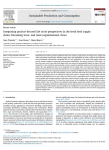Toniolo S., Russo I., Bravo I. (2024). Integrating product-focused life cycle perspectives in the fresh food supply chain: revealing intra- and inter-organizational views. Sustainable Production and Consumption, 01/07/2024, vol. 48, p. 46-61.
https://doi.org/10.1016/j.spc.2024.05.009
https://doi.org/10.1016/j.spc.2024.05.009
| Titre : | Integrating product-focused life cycle perspectives in the fresh food supply chain: revealing intra- and inter-organizational views (2024) |
| Auteurs : | S. Toniolo ; I. Russo ; I. Bravo |
| Type de document : | Article |
| Dans : | Sustainable Production and Consumption (vol. 48, July 2024) |
| Article en page(s) : | p. 46-61 |
| Langues : | Anglais |
| Catégories : |
Catégories principales 10 - INDUSTRIES ; 10.2 - IAA (en général)Thésaurus IAMM CHAINE D'APPROVISIONNEMENT ; PRODUIT FRAIS ; FRUITS ET LEGUMES ; CYCLE DE VIE ; SYSTEME AGROALIMENTAIRE |
| Résumé : | Perishable food products generate significant waste and consume a high amount of energy due to quality and safety maintenance requirements, stressing supply chains and highlighting the need to improve their efficiency and environmental sustainability. Integrating the life cycle perspective in the fresh foods supply chains can provide valuable insights for improving environmental sustainability. The primary objective of this study is to show how each actor in the fresh food supply chain can reduce its environmental impact by using a life cycle perspective. It also reveals the environmental concerns created by perishable products and current practices by using a life cycle perspective that can be integrated into the supply chain. The study also explores how the product-focused approach of the life cycle perspective can be integrated across the fresh foods supply chains to reveal both intra- and inter-organizational practices. By analysing 40 different studies, this research explores the life cycle?based aspects and the environmental concerns associated with fresh food agricultural products and identifies the practices that can be adopted by supply chain actors to manage these concerns. These practices range from individualized (can be put in place at a function and/or organization level) to highly interconnected (can be applied only through cooperation with other parties along the supply chain), creating dyadic, triadic or extended network cooperation. It is found that these actions can be translated into three dimensions: technological, related to the use of efficient and optimized technologies; operational, related to the reduction of raw materials consumption, distribution configurations and the improvements of crops; and management, related to monitoring, improvement targets, and local supply chain configurations. Future research could expand to include targeted literature reviews on underexplored areas such as biowaste generation and food waste management along the supply chain. |
| Cote : | En ligne |
| URL / DOI : | https://doi.org/10.1016/j.spc.2024.05.009 |







